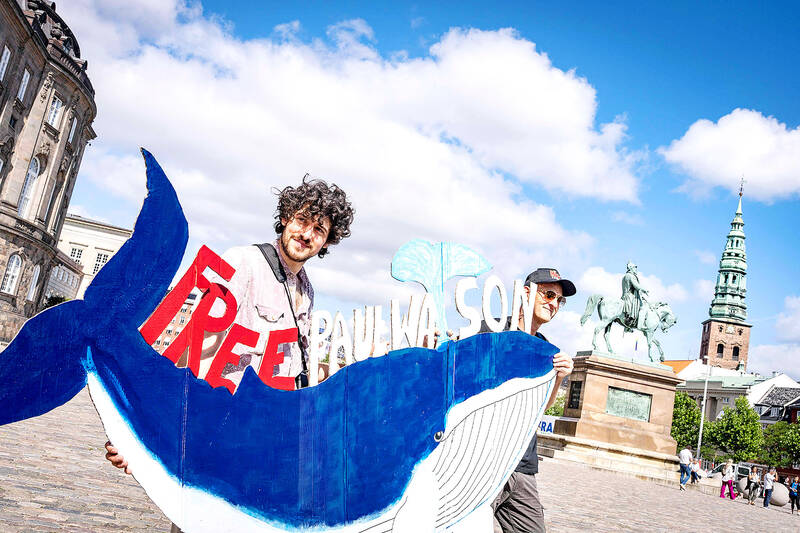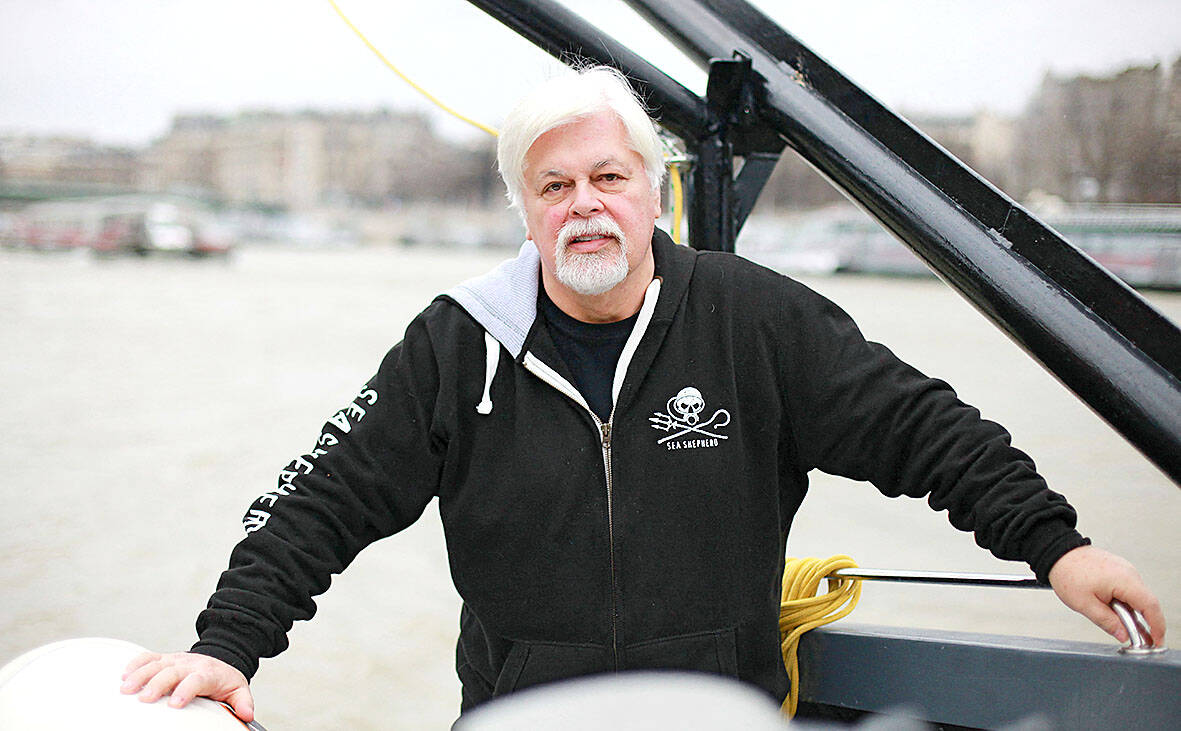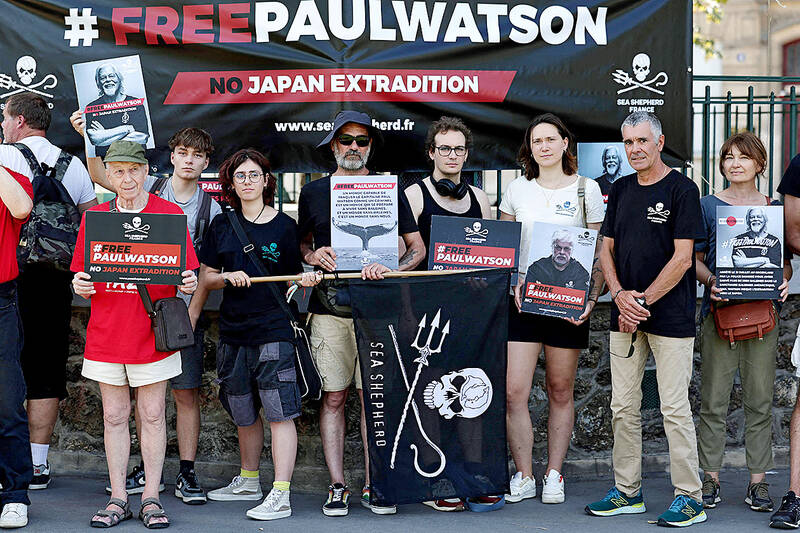For years a bete noire of Japan, one of the last three countries along with Iceland and Norway to practice commercial whale hunting, Watson was arrested on July 21 in Greenland, an autonomous Danish territory.
The 73-year-old American-Canadian was arrested under an Interpol “red notice” issued by Japan. A Greenland court will tomorrow hold a hearing to decide whether to extend his detention pending the request.
Brigitte Bardot, the French screen legend turned animal rights activist, rushed to his defense, telling the daily newspaper Le Parisien that the Japanese government had “launched a global manhunt” against Watson, who was “caught in the trap.”

Photo: AFP
Emmanuel Macron, the president of France, where Watson has lived for the past year, also pressed Danish authorities not to extradite the campaigner, according to his office.
PIRATE OF COMPASSION
Watson devoted himself to saving marine life in 1977, forming what would become the Sea Shepherd Conservation Society. He was dismissed from the group in 2022 after in-fighting, which he said left a bitter taste. Some branches of the association, including that of France, continue to support him.

Photo: AFP
Before then he had spent time with the Canadian Coast Guard and Norwegian and Swedish merchant marine ships.
Over the years he has become a familiar face in the media, appearing in the reality TV series Whale Wars and well-known for his innovative direct action tactics: chasing, harassing, scuttling and ramming illegal whaling and fishing vessels.
“We are pirates of compassion hunting down and destroying pirates of profit,” Sea Shepherd’s Web site quotes him as saying.

Photo: AFP
He uses acoustic weapons, water cannon and stink bombs against whalers.
Employing these methods, he has sunk more than a dozen boats and raided just as many.
As a campaigner, he has drawn on his degree in communications, galvanizing support and funding from stars including longtime patron Bardot, Sean Penn, Pierce Brosnan and Pamela Anderson.
FROM BEAVERS TO WHALES
Born in Toronto in 1950, the eldest of seven children, Watson grew up in a fishing village in New Brunswick in eastern Canada. He lost his mother when he was 13 and two years later he left home after falling out with his father.
His passion for whales was sparked in 1975, he says, when he was caught in a standoff with Soviet whalers and looked a dying whale in the eye.
“If we cannot save the whales, turtles, sharks, tuna and complex marine biodiversity, the oceans will not survive,” he said in a Web interview in 2017.
“And if the oceans die, humanity will die, for we cannot survive on this planet with a dead ocean.”
ECO-TERRORIST
Over 45 years, the intrepid captain has carried out spectacular operations from Siberia to Iceland, Norway, the Faroe Islands and Japan.
With his crews he has saved thousands of whales and spotlighted the illegal activities of whalers.
In 2010 Sea Shepherd clashed violently with Japanese boats, leading to the sinking of the organization’s high-tech super boat Ady Gil in the remote Southern Ocean.
Tokyo has accused him of causing injury and damage to one of its whaling ships in the Antarctic in 2020.
He regularly says in interviews “we’ve never injured anybody.” At the time, Japanese ships hunted whales in the Antarctic and North Pacific for what it said were scientific purposes.
BATTLES ON SEA AND LAND
The white-bearded father of three claims in his biography to have co-founded Greenpeace in 1972 but said he parted ways with the group over arguments about protest tactics.
His ex-allies, and also the Japanese government, label him an “Eco-terrorist” because of his radical tactics.
He was detained for several months in the Netherlands in 1997 and lived in exile on the high seas from 2012 to 2014.
His next battle is in court.
He was arrested on the John Paul DeJoria in Greenland as the ship was headed to “intercept” Japan’s new whaling factory vessel in the North Pacific, his foundation said.

June 2 to June 8 Taiwan’s woodcutters believe that if they see even one speck of red in their cooked rice, no matter how small, an accident is going to happen. Peng Chin-tian (彭錦田) swears that this has proven to be true at every stop during his decades-long career in the logging industry. Along with mining, timber harvesting was once considered the most dangerous profession in Taiwan. Not only were mishaps common during all stages of processing, it was difficult to transport the injured to get medical treatment. Many died during the arduous journey. Peng recounts some of his accidents in

“Why does Taiwan identity decline?”a group of researchers lead by University of Nevada political scientist Austin Wang (王宏恩) asked in a recent paper. After all, it is not difficult to explain the rise in Taiwanese identity after the early 1990s. But no model predicted its decline during the 2016-2018 period, they say. After testing various alternative explanations, Wang et al argue that the fall-off in Taiwanese identity during that period is related to voter hedging based on the performance of the Democratic Progressive Party (DPP). Since the DPP is perceived as the guardian of Taiwan identity, when it performs well,

The Taiwan People’s Party (TPP) on May 18 held a rally in Taichung to mark the anniversary of President William Lai’s (賴清德) inauguration on May 20. The title of the rally could be loosely translated to “May 18 recall fraudulent goods” (518退貨ㄌㄨㄚˋ!). Unlike in English, where the terms are the same, “recall” (退貨) in this context refers to product recalls due to damaged, defective or fraudulent merchandise, not the political recalls (罷免) currently dominating the headlines. I attended the rally to determine if the impression was correct that the TPP under party Chairman Huang Kuo-Chang (黃國昌) had little of a

At Computex 2025, Nvidia CEO Jensen Huang (黃仁勳) urged the government to subsidize AI. “All schools in Taiwan must integrate AI into their curricula,” he declared. A few months earlier, he said, “If I were a student today, I’d immediately start using tools like ChatGPT, Gemini Pro and Grok to learn, write and accelerate my thinking.” Huang sees the AI-bullet train leaving the station. And as one of its drivers, he’s worried about youth not getting on board — bad for their careers, and bad for his workforce. As a semiconductor supply-chain powerhouse and AI hub wannabe, Taiwan is seeing